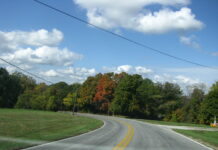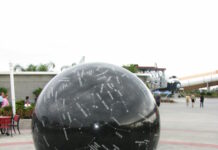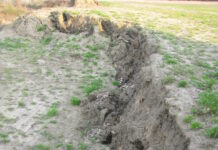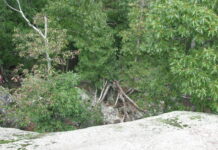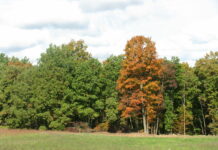Photo credit: DiasporaEngager (www.DiasporaEngager.com).
Several days after the beginning of anti-Israel student sit-ins on US campuses, those protests began to garner expressions of support from perpetrators and patrons of terrorism.
On April 23, the Popular Front for the Liberation of Palestine (PFLP) issued a statement condemning “the repressive practices of the administrations of universities in the United States” against “our [sic] students in American universities.”
“We in the Popular Front for the Liberation of Palestine, along with all our people, the honorable of our nation and the world, confirm our steadfast support for the struggle of the student and youth movements, Students for Justice in Palestine (SJP) and the Palestinian Youth Movement (PYM) at universities such as Columbia, Rutgers, Yale, and Stanford, among others. We call for enhancing the unity of students and their struggle to divest American universities from the zionist entity and cut all forms of relations with it.”
On April 24, the protests got the endorsement of Iran’s Supreme Leader:
On April 25, Hamas released a statement:
On April 26, it was the turn of the Houthis:
More insight into Iranian views of the topic was provided on the same day in a TV interview with an Iranian professor:
Tehran University professor Foad Izadi, one of the leading mouthpieces of the Iranian regime, discussed encampments in American college campuses on an April 26, 2024 show on Ofogh TV (Iran). He said that Iranians like what they see on the college campuses, but “it should not end with this.” Izadi continued to say that these students are “our people.” He added that if tensions between America an Iran rise, “these are the people who will have to take to the streets to support of Iran.” Izadi said that Iran could potentially repeat what it did in Lebanon in greater measure, because its “Hizbullah-style” groups in America are “much larger” than in Lebanon.
So how did media organizations, specifically the BBC’s numerous reports on the topic of the sit-ins, cover those endorsements from terrorist organizations and the terror-facilitating Iranian regime?
The answer to that question is that they didn’t. As can be seen below, BBC reports published on the relevant and following days avoided any mention of those expressions of support for the protests that were their subject matter.
Mass arrests made as US campus protests over Gaza spread by James FitzGerald and Bernd Debusmann Jr
Columbia University: Pro-Palestinian protesters refuse to disband by Brandon Drenon
House speaker Mike Johnson heckled by protesters in tense Columbia campus visit by Bernd Debusmann Jr and Mike Wendling
Pelosi urges Gaza campus protesters to target Hamas as well as Israel by Laura Kuenssberg
Major Gaza protests at US universities by Max Matza
What do pro-Palestinian student protesters at US universities want? by Sam Cabral and Ana Faguy
Campus protests: Hundreds arrested at universities across US as Gaza demonstrations continue by Anna Lamche and Ido Vock
Apparently the BBC is of the opinion that expressions of support from designated terrorist organizations (along with the relevant question of related material support) is not a part of the story about US student protests that its audiences need to know.
Hadar Sela is the co-editor of CAMERA UK – an affiliate of the Committee for Accuracy in Middle East Reporting and Analysis (CAMERA), where a version of this article first appeared.
Source of original article: Hadar Sela / Opinion – Algemeiner.com (www.algemeiner.com).
The content of this article does not necessarily reflect the views or opinion of Global Diaspora News (www.GlobalDiasporaNews.com).
To submit your press release: (https://www.GlobalDiasporaNews.com/pr).
To advertise on Global Diaspora News: (www.GlobalDiasporaNews.com/ads).
Sign up to Global Diaspora News newsletter (https://www.GlobalDiasporaNews.com/newsletter/) to start receiving updates and opportunities directly in your email inbox for free.







